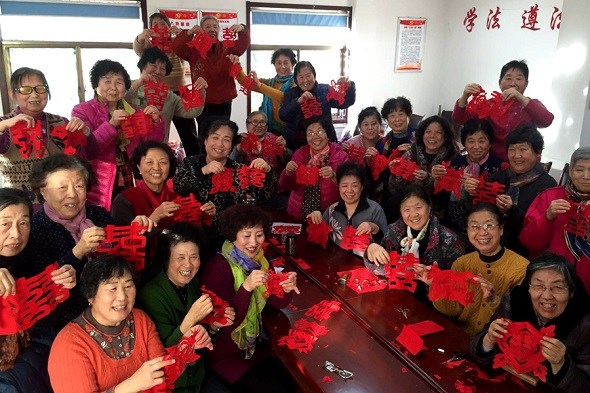
Seniors display paper-cuts made under the guidance of volunteers from Raindrop, an NGO in Jinan. (Photo Provided To China Daily)
Unsatisfactory results
"The central government spent a lot of money tackling social issues, such as aging (by providing benefits), but the results were unsatisfactory," she said, adding that solving social issues often requires more than simply handing out money. "Government employees are not really suitable for this sort of work."
Raindrop is one of 54 NGOs to have benefited from the assistance offered by the Social Organization Incubator Park in Jinan's Shizhong district, founded in 2013.
Qi Yuxin, secretary of the Shizhong association of social organizations, which oversees the park's operations, said NGOs such as Raindrop are playing active roles in fields such as assisting seniors, environmental protection and the preservation of traditional culture.
"These are fields where NGOs can supplement the role played by the government," he said.
Good governance
As social problems and conflicts become increasingly complicated, such as those between people's growing need for better lives and services and a lack of resources and professional service providers, more NGOs will be required to implement good governance, according to experts.
Wang Yongkui, a consultant with the Lixin Social Governance Consultancy in Qingdao, Shandong province, said governments excel at making arrangements on the macro level, but they are less capable of dealing with detailed, individual problems - the areas where NGOs stand out.
"The provision of public services, such as psychological counseling, legal education and conflict mediation, requires a higher level of professional knowledge and a smarter approach, which are weak points for governments. NGOs in different fields are far more suited to the job," he said.
Wang added that NGOs, which are formed by ordinary citizens, outperform governments in terms of mobilizing people. "Such factors are the key to social governance," he said.
Since the 18th National Congress of the Communist Party of China in 2012, the Party leadership has made repeated calls for the increased participation of "social organizations" - the Chinese term for NGOs, including foundations, citizens' groups and private nonprofit organizations - in social governance.
In his report to the 18th CPC National Congress in November 2012, President Hu Jintao urged Party bodies to guide social organizations so they would develop in a "healthy and orderly way" and fully engage members of the public in social management. Similar calls were made in the four plenary sessions that followed the congress.
In 2016, the State Council, China's Cabinet, issued a guideline on reforming the management of social organizations and promoting their development, which required local authorities to streamline their administrative procedures and step up efforts to develop NGOs. It also called for social work professionals to be assimilated in a national talent pool and treated the same as professionals in related industries in terms of qualifications and financial benefits.
At the 19th CPC National Congress in October, President Xi Jinping said the Party would develop the role of social organizations, and ensure that "the government's administrative efforts, society's self-regulation and residents' self-governance support each other".


















































